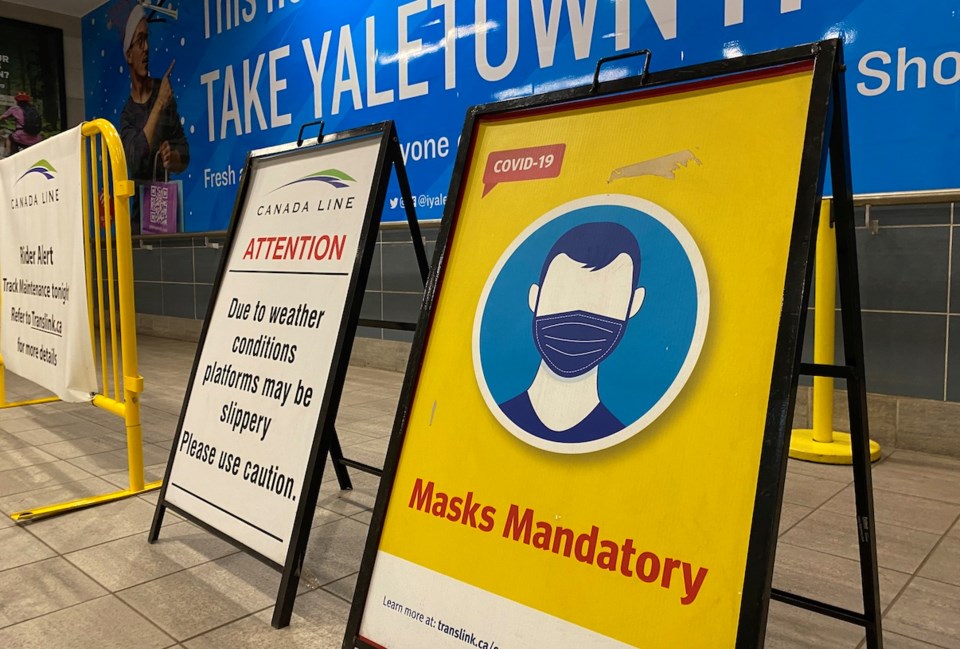B.C.'s steady decline of serious COVID-19 infections throughout February continued into March, as the province announced 523 COVID-19 patients are in hospitals, with 83 of those in intensive care units (ICUs).
That's a decline of 26 people in hospital, and two people in ICU, compared with yesterday.
A little more than a month ago, on Jan. 31, the province had its record of 1,048 people were fighting the disease in hospitals. Of those, 138 were fighting for their lives in ICUs.
Other good news is that no one was reported to have died in the past day from COVID-19. That low number may in part be because of the province's data collection system, which has long shown fewer deaths on Tuesdays.
No new outbreaks were either declared or deemed over at health-care facilities, or seniors' homes, in the past day. That leaves the province with 28 active outbreaks in those settings.
Provincial Health Officer Dr. Bonnie Henry today said COVID-19 still has "widespread transmission across the province," and this is why she did not announce any timetable to lift restrictions that require people to wear masks in indoor public spaces, and to use the B.C. Vaccine Card to enter restaurants, and other venues.
"We will be removing restrictions and layers of protection as soon as we are confident we can safely make those changes and we can support everybody in doing that," she said.
"We are being cautious. We have heard loud and clear that we need to be thoughtful, and move cautiously and slowly."
Henry told media this afternoon that vaccines have provided a "tremendous difference in reducing transmission" of COVID-19.
"It's still about 20 times more likely that you're going to have a more severe [COVID-19] illness [if you are not vaccinated,]" she said.
Data, however, shows that while people not fully vaccinated are more likely to be infected and hospitalized with COVID-19, the discrepancy between them and fully vaccinated people is not as stark as it was months ago.
Government data shows that 19.4 per cent of those infected in B.C. between Feb. 21 and Feb. 27 had not received at least two doses of vaccine, and that 34.7% of those hospitalized in B.C. between Feb. 14 and Feb. 27 were not fully vaccinated.
People who do not yet have two doses of vaccine represent about 14% of B.C.'s total population.
The more detailed data for vaccinations is that 4,516,750 eligible B.C. residents have had at least one dose of vaccine, while 4,300,859 are considered fully vaccinated with two doses, and 2,584,127 have had three doses.
Recent Statistics Canada data said that in the 2021 census, B.C.'s population had increased 7.6 per cent between 2016 and 2021, and that the new total number of residents was 5,000,879.
Glacier Media's calculation therefore is that just over 90.3 per cent of B.C.'s total population has had at least one dose of vaccine, and 86 per cent of the province's total population has had two doses. Nearly 51.7 per cent have had their booster doses.
Health officials have been telling vaccinated people with mild symptoms to self-isolate and not get tested in order to reserve testing capacity for those who have more serious cases or who are clinically vulnerable. As a result, Henry has called case count data "not accurate," and the province has stopped reporting data for how many people in B.C. they believe are actively infected, and how many are thought to have recovered.
The province still reports the number of presumed new cases, and in the past day officials have confirmed 466 new cases. The number of tests was not immediately available.
There are thought to have been at least 348,771 British Columbians who have contracted COVID-19 since the first case was detected in late January 2020.
Henry said that her plan is to move to a weekly data report, from what has been daily data releases.
"Hopefully that will be very soon," she said. •



